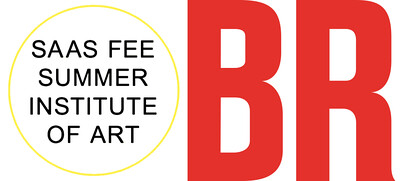For 2022, Saas-Fee Summer Institute of Art has partnered with The Brooklyn Rail to present “Deep Ecology in the Cognitive Capitalocene,” an in-person program in Brooklyn, New York, alongside a free public lecture series held online.
The theme “Deep Ecology in the Cognitive Capitalocene” builds on Gregory Bateson’s book Steps to an Ecology of Mind (1972) to produce a deep ecology of the expanded brain in the twenty-first century. In the transition from the Holocene to the Anthropocene human activity becomes the dominant influence on global climate and the environment. During this time, cosmotechnics, “the unification of the cosmos and the moral through technical activities, whether craft-making or art-making,” (Yuk Hui) is based upon conspicuous consumption and resultant destruction. Following Arne Næss’s model of a multidisciplinary deep ecology, the well-being and importance of all (non-human) life is inextricably bound to our own in a facile network of mutual respect and shared dignity. As such, we need to adapt to ecocentrism rather than anthropocentrism and give precedence to the ecosphere rather than the biosphere. In this respect, the program will aim towards developing a means to decolonize ecology by recognizing the importance of the Anthropocene’s relationship to capitalism, racism and sexism to constitute a new ecological ethics. As Jedediah Purdy has suggested, we need to produce a new environmental imagination.
We have now entered the century of the brain in which precarity, immaterial labor, the financialization of capital, and valorization from early cognitive capitalism have transitioned to late-stage cognitive capitalism in which the brain’s neural plasticity, its capacity to be modified, is the new focus of power and forms of cognitive laboring. For instance, brain-computer interfaces linked to the internet may produce a new opportunity for surfing the web using brainwaves but also produce new means to extract data emanating from thought itself. The expanded brain model is not restricted by the bony carapace we call the skull, and is not a crystalized, determined entity made up of neurons and their glial counterparts but rather is a becoming brain entangled with the environment of which accelerating technology, sociology and culture play important roles. By focusing on this expanded brain model, this situated intra-extracranial brain complex, “Deep Ecology in the Cognitive Capitalocene” aims to create a renewed ecocentric vision Timothy Morton calls ecognosis. This gnosis, a result of an unfinished evolutionary process of the becoming brain, gives us hope.
Is the refusal to tackle climate change a process of endocolinization of the brain’s neural architecture sculpted by anthropocentric technologies and their associated media conglomerates (Fake News) that enfeeble the brain and its critical capacities, creating a kind of neglect? With the sixth mass extinction at hand, we propose the need to sculpt a new neural architecture based on an assortment of ecocentric technical devices. Technologies for caring for the brain also means caring for our ecosystem as the two are entangled in a dependent coevolutionary process that has ramifications for the future. To find such a model, “Deep Ecology in the Cognitive Capitalocene” will consider the work of Bernard Stiegler, especially his concept of exosomatic organogenesis in which technical evolution of exterior artificial organs, like the handheld calculator, becomes internalized through a process of epiphylogenesis, the process through which the phylogeny of the technical species (or the evolution of technical apparatuses in time) is transmissible. Through a process of multiple exteriorizations, human (organic) matter becomes entangled with technic (organized inorganic) matter. In cognitive capitalism, one might say that the brain’s architecture has been sculpted to create an anthropocentric brain whose image of thought has been constituted by capitalism and continues its legacy. If the Anthropocene, or Capitalocene, has generated exploitive techne to dominate the ecosystem in the transformation of nature into capital then “Deep Ecology in the Cognitive Capitalocene” aims to explore new materiality based upon an ecocentric cosmotechnics, such as the Chthulucene or Ecocene, in order to transform the brain as a tool to be used in our struggle for survival.
Faculty
Franco Berardi, Nicolas Bourriaud, Phong Bui, Mareike Dittmer, Thyrza Goodeve, Joan Jonas, Agnieszka Kurant, Reza Negarestani, Warren Neidich (founder/director), Romy Opperman, Eliana Otta, Lucia Pietroiusti, Florencia Portocarrero, David Rothenberg, Tomás Saraceno, Barry Schwabsky (co-director), McKenzie Wark, Bruce Wexler, and others to be announced.
Applications
Applications for SFSIA 2022 are open to students, practitioners and scholars from the fields of art (including video, photography, installation and multimedia), ecology, science and technology studies, philosophy, design, architecture, critical theory, cultural studies, film and media studies, and beyond. Please see our application for more information.
About SFSIA
Saas-Fee Summer Institute of Art (SFSIA) is a nomadic, intensive summer academy with shifting programs in contemporary critical theory that stresses an interdisciplinary approach to understanding the relationship between art and politics. SFSIA originated in Saas-Fee, Switzerland in 2015 and then migrated to Berlin, Germany where it has been hosted by Import Projects (2016) and Spike (2017-2019). Additional programs have been hosted by Otis College of Art and Design in Los Angeles, Performance Space New York, and sonsbeek20→24 in Arnhem, The Netherlands. SFSIA was founded and is directed by Warren Neidich and is co-directed by Barry Schwabsky. Sarrita Hunn is the assistant director.
About The Brooklyn Rail
Founded in October 2000, The Brooklyn Rail provides an independent forum for arts, culture, and politics throughout New York City and far beyond. Our journal features criticism of visual art, music, dance, film, theater and literature, alongside thoughtful political commentary and original fiction and poetry. The Rail is distributed free of charge both in print and online, and further fulfills its mission by curating art exhibitions, panel discussions, reading series and film screenings that reflect the complexity and inventiveness of the city’s artistic and cultural landscape.
Please see our website or contact info [at] sfsia.art for more information. Saas-Fee Summer Institute of Art also thanks Industry City for hosting our program.



